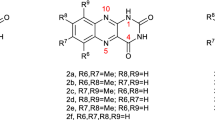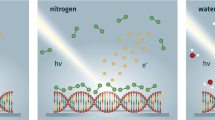Abstract
IN investigations of the sensitivity of enzymes to ionizing radiations both in the solid state and in solution a marked variability has been observed between different batches of one enzyme1. This has been ascribed to the presence of protective agents which are impurities even in samples of high enzymatic activity, and which are often difficult to remove. Little has been done to identify such natural agents although various substances, particularly sulphydryl compounds, have long been recognized as being especially effective as protective agents. It was suggested by Howard-Flanders2 that these compounds act by donating hydrogen atoms to the radicals formed under the action of radiation, thus repairing the initial damage.
This is a preview of subscription content, access via your institution
Access options
Subscribe to this journal
Receive 51 print issues and online access
$199.00 per year
only $3.90 per issue
Buy this article
- Purchase on Springer Link
- Instant access to full article PDF
Prices may be subject to local taxes which are calculated during checkout
Similar content being viewed by others
References
Butler, J. A. V., and Robins, A. B., Nature, 186, 697 (1960); Rad. Res. (in the press).
Howard-Flanders, P., Nature, 186, 485 (1960).
Author information
Authors and Affiliations
Rights and permissions
About this article
Cite this article
BUTLER, J., ROBINS, A. Metal Ion Redox Systems as Radiation Protective Agents. Nature 193, 673–674 (1962). https://doi.org/10.1038/193673b0
Issue Date:
DOI: https://doi.org/10.1038/193673b0
This article is cited by
-
Zinc toxicity in irradiatedBacillus megaterium
Experientia (1974)
-
The effects of iron upon the radiation damage in non-heme iron proteins
Biophysik (1971)
-
Combined Lethal Effect of Zinc Chloride and Gamma Irradiation on Bacillus megaterium
Nature (1968)
-
In vivo Investigation of the Removal of Trace Elements from Nucleic Acids of Yeast by Ionizing Radiation
Nature (1963)
Comments
By submitting a comment you agree to abide by our Terms and Community Guidelines. If you find something abusive or that does not comply with our terms or guidelines please flag it as inappropriate.



